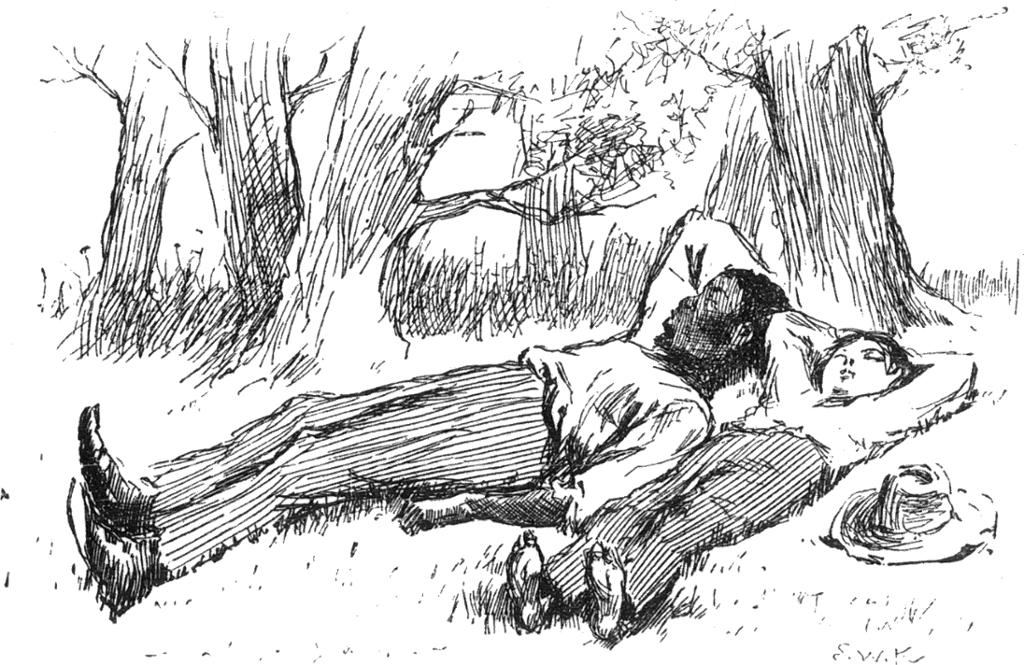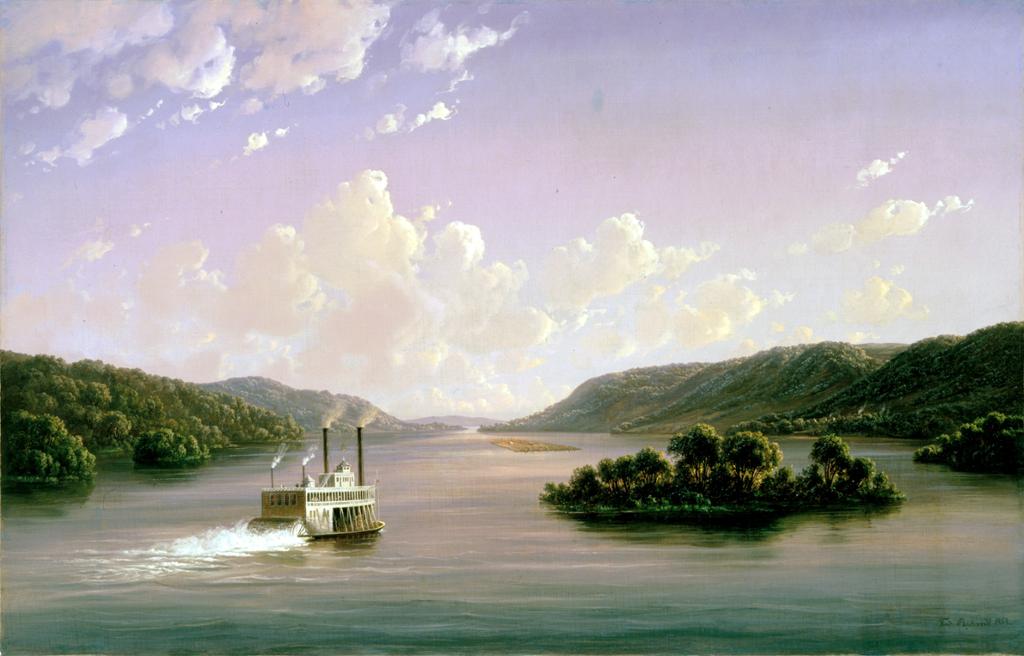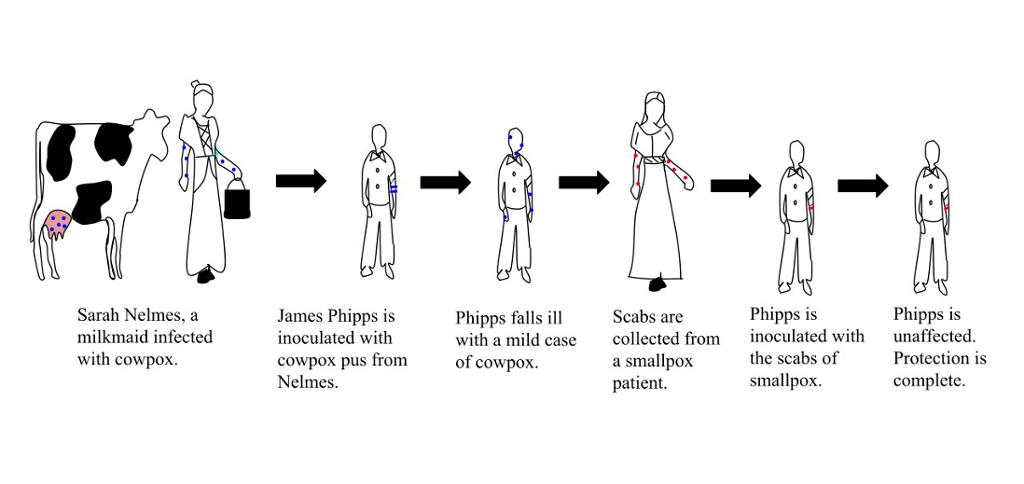Adventures of Huckleberry Finn by Mark Twain

Note that the excerpt contains language that today is considered racist and offensive.
The excerpt is included because of its historic significance: the language illustrates the difference in attitudes between our time, the time the novel describes, and the time the novel was written.
Background
The novel is set in Missouri during the 1830s or 1840s. Missouri was a slave state.
The novel Huckleberry Finn picks up where the novel Tom Sawyer leaves off. Huckleberry, 'Huck' for short, has come into some money, and he has been adopted. His drunken father returns to town and tries to get his son's money, eventually kidnapping him.
To escape his abusive father, Huck fakes his own death. He meets Jim, who is a runaway slave. The two of them find a raft and set down the Mississippi River together, looking for the town Cairo, which is in a state that doesn't have slavery. Jim hopes to go from there to freedom in the North. Huckleberry is unsure if it is right to help a runaway slave. He feels that it can be regarded as taking someone else's property.
We slept most all day, and started out at night, a little ways behind a monstrous long raft that was as long going by as a procession. She had four long sweeps at each end, so we judged she carried as many as thirty men, likely. She had five big wigwams aboard, wide apart, and an open camp fire in the middle, and a tall flag-pole at each end. There was a power of style about her. It amounted to something being a raftsman on such a craft as that.
We went drifting down into a big bend, and the night clouded up and got hot. The river was very wide, and was walled with solid timber on both sides; you couldn’t see a break in it hardly ever, or a light. We talked about Cairo, and wondered whether we would know it when we got to it. I said likely we wouldn’t, because I had heard say there warn’t but about a dozen houses there, and if they didn’t happen to have them lit up, how was we going to know we was passing a town? Jim said if the two big rivers joined together there, that would show. But I said maybe we might think we was passing the foot of an island and coming into the same old river again. That disturbed Jim—and me too. So the question was, what to do? I said, paddle ashore the first time a light showed, and tell them pap was behind, coming along with a trading-scow, and was a green hand at the business, and wanted to know how far it was to Cairo. Jim thought it was a good idea, so we took a smoke on it and waited.
There warn’t nothing to do now but to look out sharp for the town, and not pass it without seeing it. He said he’d be mighty sure to see it, because he’d be a free man the minute he seen it, but if he missed it he’d be in a slave country again and no more show for freedom. Every little while he jumps up and says:
“Dah she is?”
But it warn’t. It was Jack-o’-lanterns, or lightning bugs; so he set down again, and went to watching, same as before. Jim said it made him all over trembly and feverish to be so close to freedom. Well, I can tell you it made me all over trembly and feverish, too, to hear him, because I begun to get it through my head that he was most free—and who was to blame for it? Why, me. I couldn’t get that out of my conscience, no how nor no way. It got to troubling me so I couldn’t rest; I couldn’t stay still in one place. It hadn’t ever come home to me before, what this thing was that I was doing. But now it did; and it stayed with me, and scorched me more and more. I tried to make out to myself that I warn’t to blame, because I didn’t run Jim off from his rightful owner; but it warn’t no use, conscience up and says, every time, “But you knowed he was running for his freedom, and you could a paddled ashore and told somebody.”
That was so—I couldn’t get around that noway. That was where it pinched. Conscience says to me, “What had poor Miss Watson done to you that you could see her nigger go off right under your eyes and never say one single word? What did that poor old woman do to you that you could treat her so mean? Why, she tried to learn you your book, she tried to learn you your manners, she tried to be good to you every way she knowed how. That’s what she done.”
I got to feeling so mean and so miserable I most wished I was dead. I fidgeted up and down the raft, abusing myself to myself, and Jim was fidgeting up and down past me. We neither of us could keep still. Every time he danced around and says, “Dah’s Cairo!” it went through me like a shot, and I thought if it was Cairo I reckoned I would die of miserableness.
Jim talked out loud all the time while I was talking to myself. He was saying how the first thing he would do when he got to a free State he would go to saving up money and never spend a single cent, and when he got enough he would buy his wife, which was owned on a farm close to where Miss Watson lived; and then they would both work to buy the two children, and if their master wouldn’t sell them, they’d get an Ab’litionist to go and steal them.
It most froze me to hear such talk. He wouldn’t ever dared to talk such talk in his life before. Just see what a difference it made in him the minute he judged he was about free. It was according to the old saying, “Give a nigger an inch and he’ll take an ell.” Thinks I, this is what comes of my not thinking. Here was this nigger, which I had as good as helped to run away, coming right out flat-footed and saying he would steal his children—children that belonged to a man I didn’t even know; a man that hadn’t ever done me no harm.
I was sorry to hear Jim say that, it was such a lowering of him. My conscience got to stirring me up hotter than ever, until at last I says to it, “Let up on me—it ain’t too late yet—I’ll paddle ashore at the first light and tell.” I felt easy and happy and light as a feather right off. All my troubles was gone. I went to looking out sharp for a light, and sort of singing to myself. By and by one showed. Jim sings out:
“We’s safe, Huck, we’s safe! Jump up and crack yo’ heels! Dat’s de good ole Cairo at las’, I jis knows it!”

I says:
“I’ll take the canoe and go and see, Jim. It mightn’t be, you know.”
He jumped and got the canoe ready, and put his old coat in the bottom for me to set on, and give me the paddle; and as I shoved off, he says:
“Pooty soon I’ll be a-shout’n’ for joy, en I’ll say, it’s all on accounts o’ Huck; I’s a free man, en I couldn’t ever ben free ef it hadn’ ben for Huck; Huck done it. Jim won’t ever forgit you, Huck; you’s de bes’ fren’ Jim’s ever had; en you’s de only fren’ ole Jim’s got now.”
I was paddling off, all in a sweat to tell on him; but when he says this, it seemed to kind of take the tuck all out of me. I went along slow then, and I warn’t right down certain whether I was glad I started or whether I warn’t. When I was fifty yards off, Jim says:
“Dah you goes, de ole true Huck; de on’y white genlman dat ever kep’ his promise to ole Jim.”
Well, I just felt sick. But I says, I got to do it—I can’t get out of it. Right then along comes a skiff with two men in it with guns, and they stopped and I stopped. One of them says:
“What’s that yonder?”
“A piece of a raft,” I says.
“Do you belong on it?”
“Yes, sir.”
“Any men on it?”
“Only one, sir.”
“Well, there’s five niggers run off to-night up yonder, above the head of the bend. Is your man white or black?”
I didn’t answer up prompt. I tried to, but the words wouldn’t come. I tried for a second or two to brace up and out with it, but I warn’t man enough—hadn’t the spunk of a rabbit. I see I was weakening; so I just give up trying, and up and says:
“He’s white.”
“I reckon we’ll go and see for ourselves.”
“I wish you would,” says I, “because it’s pap that’s there, and maybe you’d help me tow the raft ashore where the light is. He’s sick—and so is mam and Mary Ann.”
“Oh, the devil! we’re in a hurry, boy. But I s’pose we’ve got to. Come, buckle to your paddle, and let’s get along.”
I buckled to my paddle and they laid to their oars. When we had made a stroke or two, I says:
“Pap’ll be mighty much obleeged to you, I can tell you. Everybody goes away when I want them to help me tow the raft ashore, and I can’t do it by myself.”
“Well, that’s infernal mean. Odd, too. Say, boy, what’s the matter with your father?”
“It’s the—a—the—well, it ain’t anything much.”
They stopped pulling. It warn’t but a mighty little ways to the raft now. One says:
“Boy, that’s a lie. What is the matter with your pap? Answer up square now, and it’ll be the better for you.”
“I will, sir, I will, honest—but don’t leave us, please. It’s the—the—Gentlemen, if you’ll only pull ahead, and let me heave you the headline, you won’t have to come a-near the raft—please do.”
“Set her back, John, set her back!” says one. They backed water. “Keep away, boy—keep to looard. Confound it, I just expect the wind has blowed it to us. Your pap’s got the small-pox, and you know it precious well. Why didn’t you come out and say so? Do you want to spread it all over?”
“Well,” says I, a-blubbering, “I’ve told everybody before, and they just went away and left us.”
“Poor devil, there’s something in that. We are right down sorry for you, but we—well, hang it, we don’t want the small-pox, you see. Look here, I’ll tell you what to do. Don’t you try to land by yourself, or you’ll smash everything to pieces. You float along down about twenty miles, and you’ll come to a town on the left-hand side of the river. It will be long after sun-up then, and when you ask for help you tell them your folks are all down with chills and fever. Don’t be a fool again, and let people guess what is the matter. Now we’re trying to do you a kindness; so you just put twenty miles between us, that’s a good boy. It wouldn’t do any good to land yonder where the light is—it’s only a wood-yard. Say, I reckon your father’s poor, and I’m bound to say he’s in pretty hard luck. Here, I’ll put a twenty-dollar gold piece on this board, and you get it when it floats by. I feel mighty mean to leave you; but my kingdom! it won’t do to fool with small-pox, don’t you see?”
“Hold on, Parker,” says the other man, “here’s a twenty to put on the board for me. Good-bye, boy; you do as Mr. Parker told you, and you’ll be all right.”
“That’s so, my boy—good-bye, good-bye. If you see any runaway niggers you get help and nab them, and you can make some money by it.”
“Good-bye, sir,” says I; “I won’t let no runaway niggers get by me if I can help it.”
They went off and I got aboard the raft, feeling bad and low, because I knowed very well I had done wrong, and I see it warn’t no use for me to try to learn to do right; a body that don’t get started right when he’s little ain’t got no show—when the pinch comes there ain’t nothing to back him up and keep him to his work, and so he gets beat. Then I thought a minute, and says to myself, hold on; s’pose you’d a done right and give Jim up, would you felt better than what you do now? No, says I, I’d feel bad—I’d feel just the same way I do now. Well, then, says I, what’s the use you learning to do right when it’s troublesome to do right and ain’t no trouble to do wrong, and the wages is just the same? I was stuck. I couldn’t answer that. So I reckoned I wouldn’t bother no more about it, but after this always do whichever come handiest at the time.
Relatert innhold
Tasks related to the excerpt from Huckleberry Finn by Mark Twain.
